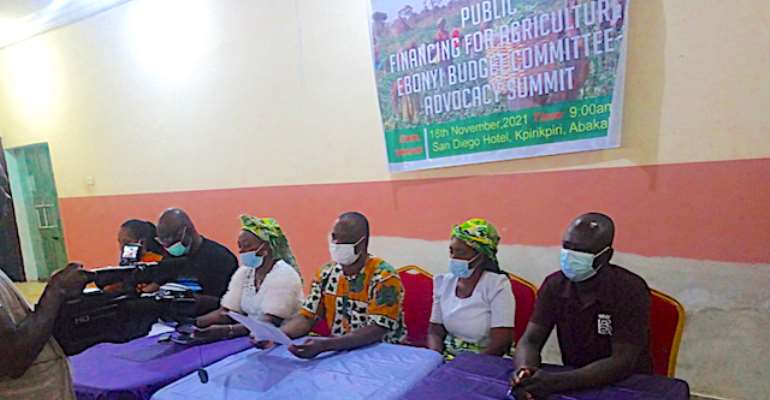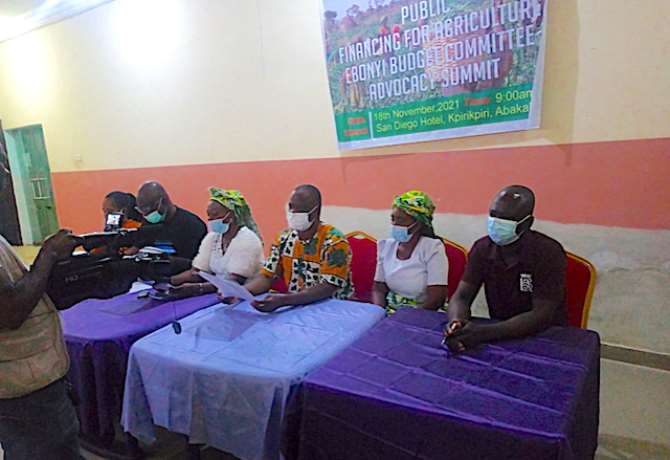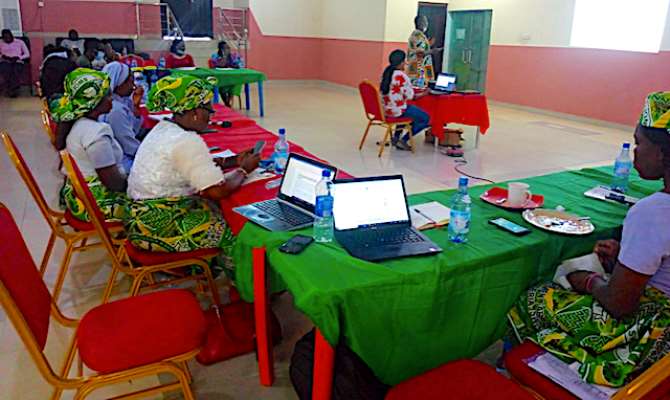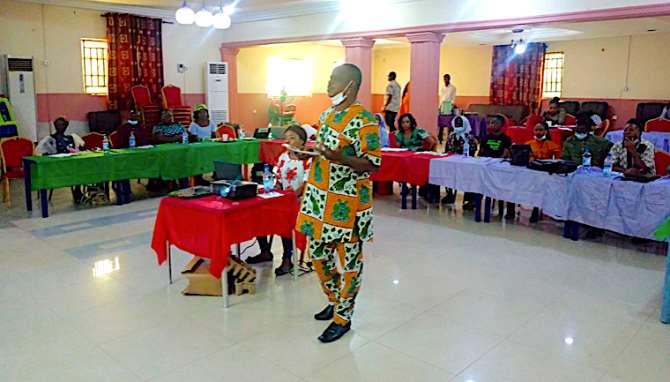Ebonyi: Ngo's Committee Task Government On Increased Funding For Agriculture.

The Ebonyi State independent Budget Committee has called on the State executive and legislative arms to Scale up Public Investment in Agriculture as a strategic approach to increasing food production, reducing hunger and poverty in the State.
The call was contained in a communiqué issued at the end of the Committee's one-day summit on public financing for Agriculture held on Thursday at San Diego Hotel, Abakaliki, Ebonyi State capital.
The 29-member Committee is a brainchild ActionAid Nigeria, in collaboration with Participatory Development Alternative, a Non-governmental Organization in Ebonyi State. Membership of the Committee was drawn from partner Non-governmental/Civil Society organizations, Smallholder Women farmers Association as well as the media.
Briefing journalists on the 15-point recommendation from the communiqué, the committee led by its State coordinator, Mathias Okinya, urged the State government to commit at least, 10% of its annual budget to agriculture sector to meet the commitment of the Maputo/Malabo Declaration which is required to support at least 6% growth rate for the sector as postulated under the Comprehensive Africa Agriculture Development Programme.
It challenged the State Assembly to ensure timely consideration, passage of budget as well as monitor prompt release and implementation of total budgeted funds for the Agricultural sector.
Observing that the State budget process do not often take cognizance of the needs of real farmers in the State, the group advocated that the State government should engage more farmers, especially the smallholder women farmers in budget planning, discussion and implementation so as to ensure gender balance and encourage participatory budget process.
Considering the incessant violent land disputes across the State and its attendant security risks affecting farmers and their farming activities, the group further urged the government to promote the enrolment of smallholder farmers into agricultural insurance policies, while confronting other insecurity issues and natural disasters that threaten the farms and farmers.
The Communiqué further recommended: “Public investment in agriculture should be scaled up in the specific areas of Extension Services, Access to Credit, Women in Agriculture, Youth in Agriculture, labour-Saving Technologies, Inputs, Post-Harvest Loss Reduction, processing facilities/storage facilities, trainings, market access, Research and Development, Monitoring and Evaluation, as well as Coordination.
“In the light of late budget releases, MDAs need to itemise their priorities and give a proper timeline that synchronizes with farmers and farm seasons. Without such timed budget, capital budget releases may not be coming at the time when farmers need them.
“The State Government may need to legislate on warehousing funds for Agriculture Sector to mitigate the negative effect of untimely release of funds. It should also channel financing according to comparative community advantages.
”The State Ministry of Agriculture and Civil Society Organizations should create more awareness/sensitization of stakeholders on the new agricultural policy as part of effort towards promoting improved citizen participation in budget process."
While calling for strengthened relationship between the State Governments and the Non-State Actors such as the NGOs/CSOs to promote accountability and transparency in public resource management, the Committee also urged all relevant stakeholders to strengthen their monitoring of Agricultural projects implementation as provided for in the budget in their various communities.
The communiqué appreciated the support of the media towards the promotion of Agricultural policies and developments in the State in particular, and called on them to increase their collaboration with the civil society groups in promoting increased investment and financing for Agriculture.
Adumbrating further, Okinya, also the Executive Director of a partner NGO, Community Health and Development Initiative, explained that the summit was a follow-up from the national summit held recently in Abuja, under the sponsorship of ActionAid where far reaching resolutions were made towards improved funding for agriculture.
Setting the tone for the advocacy summit, a representative of ActionAid, Nigeria, Azubuike Nwokoye, charged the Committee to be open to knowledge, interfacing with one another and committed to the cause of steering government’s budget towards the welfare of citizens, especially as it affects public financing for Agriculture.
One of the participants at the summit representing Advocates for Accountability & Inclusion in Africa, Agnes Okoh, commended ActionAid Nigeria for consistently improving budgetary response to agriculture in the State since 2015.
According to Okoh, the activities of the Committee with support from ActionAid raised the total budgetary allocation to Agriculture in the State from 1.5% in 2015 to 2.4% in 2016 while in 2017, 2018 and 2019; Agriculture was allocated 3.7%, 3.2% and 3.6% respectively.
Other participants however, tasked the government to give more financial attention to women farmers in general as they are known to be responsible for about 70% of Agricultural produce in the country.



